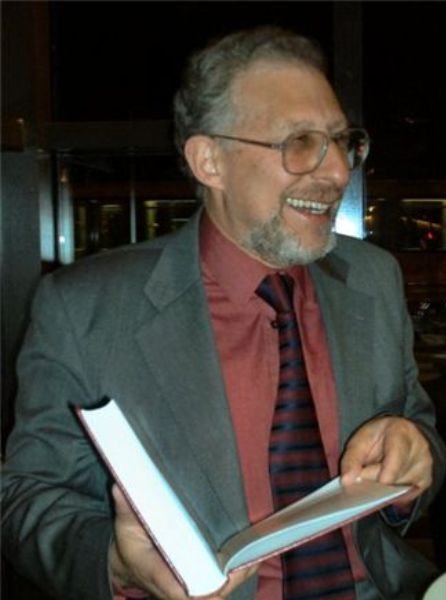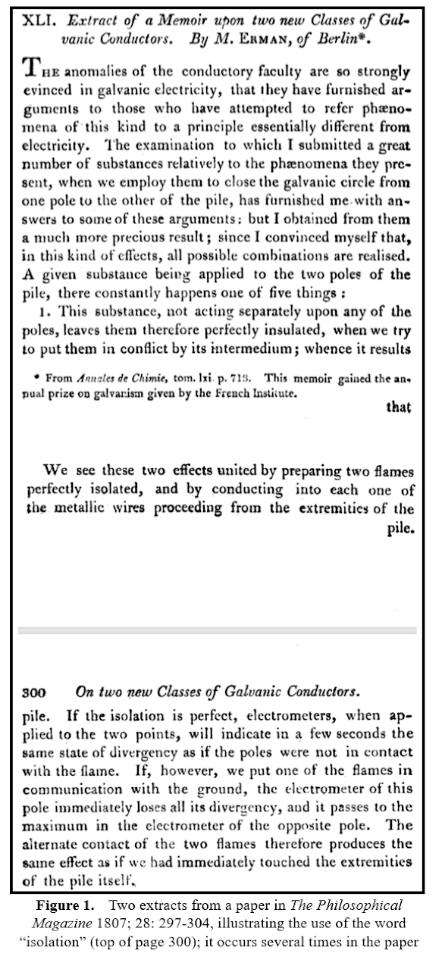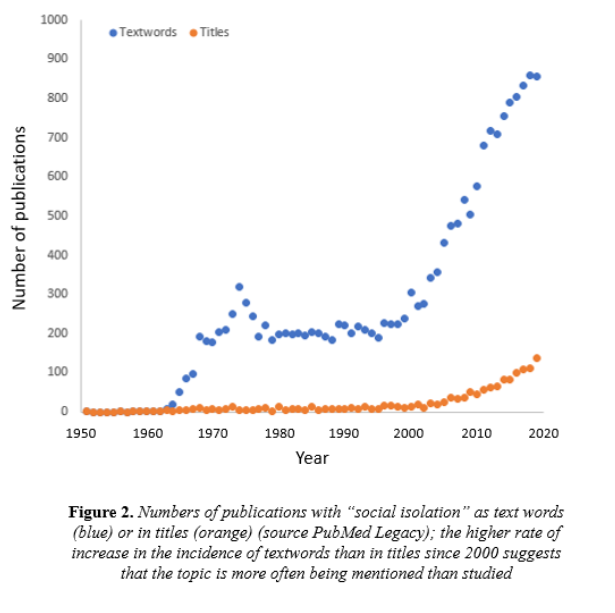 “No man is an island, entire of itself”. Eight words from John Donne’s “Meditation XVII”, one of his Devotions upon Emergent Occasions (1624), that remind us why isolation, a necessary precaution that we must undergo, is such a dreadful thing for many of us.
“No man is an island, entire of itself”. Eight words from John Donne’s “Meditation XVII”, one of his Devotions upon Emergent Occasions (1624), that remind us why isolation, a necessary precaution that we must undergo, is such a dreadful thing for many of us.
In an unusual aspect of orthography, the Greeks used a sign called a breathing over a vowel at the start of a word. A sign like a comma, a smooth breathing, was not sounded; a reversed comma, a rough breathing, was aspirated, like the letter aitch. For example, in Greek six was ἑξ, pronounced hex, as in hexachlorophene. But in Latin the rough breathing was replaced by the letter s, giving sex, as in sextet. Salt in Greek was ἅλς, [h]als, whence halides and halogens; but in Latin it became sal, from which we get sal ammoniac, saline, and salary, since the money with which Roman soldiers were paid was intended to be used to buy salt.
Because the sea is salty it was called salum in Latin. And the word for an island, insula, conjecturally comes from [terra] in salo, land in the sea. Or it could be terra insola, i.e. on its own, solo. From insula the French derived the noun “île”, an island (the circumflex marks the missing s), and the adjective “isolé” meant enisled or isolated.
The first attested uses of “isolé” in English texts, listed in the Oxford English Dictionary, are from the middle of the 18th century. Lord Chesterfield, for instance, in a letter to his son in 1757, proclaimed that he was “in every sense isolé”. Within a few years, however, an English form was found, and “isolated” appeared in the 1760s. Then some time later, a back formation emerged, as a verb, “isolate”, first attested in 1807, and an adjective, also “isolate”, perhaps partly influenced by the Italian form of isolé, “isolato”. The noun “isolation” is first attested in the dictionary in 1833 and attributed to Harriet Martineau: “The exiles condemned to the mines run a risk of isolation proportioned to the smallness of their numbers.” A problem with this analysis is that I have found earlier instances of “isolation”, including one from 1807 (Figure 1). There may be earlier instances, but I am not sure about their provenance.

Isolation takes two forms, mental and physical. Most of us should be able to cope with the former. We have many methods of remote communication, by telephone and video, by email and social media. Radio and television need not be affected, since broadcasters can work from home. In the Centre for Evidence Based Medicine we too have been working from home, producing material for the Oxford COVID-19 Evidence Service. My own contributions, in remote collaboration with others, have included articles on making prophylactic antibiotics available to be taken in case of an added bacterial infection, an analysis of current trials of pharmacological treatments for COVID-19, evidence for the efficacy of social distancing, how SARS-CoV-2 can spread through ocular fluids, and caveats about ACE inhibitors and ARBs. Other topics in preparation include: the pharmacology of chloroquine and hydroxychloroquine and evidence of their efficacy in COVID-19; and vitamin C.
But those without access to remote facilities may find mental isolation hard to cope with. And how much more difficult will it be to cope with physical isolation? Many people say that they miss the touch of others, and those who live alone will find isolation especially hard.
Here are two examples of the many studies on social isolation (Figure 2). In a systematic review of 22 studies, social rejection or isolation was one of the factors that contributed to the adverse psychological effects of SARS on employees. And in a study of neural responses to hand holding after bereavement, using functional magnetic resonance imaging, looking at a photograph of the deceased caused increased activity in the anterior cingulate cortex and, perhaps appropriately, the anterior insula; the effect on the insula was reduced by hand holding with a romantic partner. Apparently, the island in the brain can make us feel desolate.

Hamlet seemed to think that he could cope with isolation. As he said,: “I could be bounded in a nutshell and count myself king of infinite space”, but then added, “were it not that I have bad dreams”. Of course, none of us, I suppose, has to cope with the suspicion that our uncle has murdered our father, but even minor concerns can stimulate bad dreams.
So remember John Donne’s meditation, given in full below; it contains more than one message of contemporary relevance, whether you’re religious or not.
| PERCHANCE he for whom this bell tolls may be so ill, as that he knows not it tolls for him; and perchance I may think myself so much better than I am, as that they who are about me, and see my state, may have caused it to toll for me, and I know not that. The church is Catholic, universal, so are all her actions; all that she does belongs to all. When she baptizes a child, that action concerns me; for that child is thereby connected to that body which is my head too, and ingrafted into that body whereof I am a member. And when she buries a man, that action concerns me: all mankind is of one author, and is one volume; when one man dies, one chapter is not torn out of the book, but translated into a better language; and every chapter must be so translated; God employs several translators; some pieces are translated by age, some by sickness, some by war, some by justice; but God’s hand is in every translation, and his hand shall bind up all our scattered leaves again for that library where every book shall lie open to one another. As therefore the bell that rings to a sermon calls not upon the preacher only, but upon the congregation to come, so this bell calls us all; but how much more me, who am brought so near the door by this sickness. There was a contention as far as a suit (in which both piety and dignity, religion and estimation, were mingled), which of the religious orders should ring to prayers first in the morning; and it was determined, that they should ring first that rose earliest. If we understand aright the dignity of this bell that tolls for our evening prayer, we would be glad to make it ours by rising early, in that application, that it might be ours as well as his, whose indeed it is. The bell doth toll for him that thinks it doth; and though it intermit again, yet from that minute that that occasion wrought upon him, he is united to God. Who casts not up his eye to the sun when it rises? but who takes off his eye from a comet when that breaks out? Who bends not his ear to any bell which upon any occasion rings? but who can remove it from that bell which is passing a piece of himself out of this world?
No man is an island, entire of itself; every man is a piece of the continent, a part of the main. If a clod be washed away by the sea, Europe is the less, as well as if a promontory were, as well as if a manor of thy friend’s or of thine own were: any man’s death diminishes me, because I am involved in mankind, and therefore never send to know for whom the bells tolls; it tolls for thee. Neither can we call this a begging of misery, or a borrowing of misery, as though we were not miserable enough of ourselves, but must fetch in more from the next house, in taking upon us the misery of our neighbours. Truly it were an excusable covetousness if we did, for affliction is a treasure, and scarce any man hath enough of it. No man hath affliction enough that is not matured and ripened by and made fit for God by that affliction. If a man carry treasure in bullion, or in a wedge of gold, and have none coined into current money, his treasure will not defray him as he travels. Tribulation is treasure in the nature of it, but it is not current money in the use of it, except we get nearer and nearer our home, heaven, by it. Another man may be sick too, and sick to death, and this affliction may lie in his bowels, as gold in a mine, and be of no use to him; but this bell, that tells me of his affliction, digs out and applies that gold to me: if by this consideration of another’s danger I take mine own into contemplation, and so secure myself, by making my recourse to my God, who is our only security. |
Jeffrey Aronson is a clinical pharmacologist, working in the Centre for Evidence Based Medicine in Oxford’s Nuffield Department of Primary Care Health Sciences. He is also president emeritus of the British Pharmacological Society.
Competing interests: None declared.
| This week’s interesting integer: 266
• 266 is a sphenic number, the product of three distinct primes (2 × 7 × 19), and therefore the volume of a cuboid with sides of those lengths. • 266 is a self-number. Many numbers can be generated from other numbers in the following way: add the generating number to the sum of its digits. For example, in base 10, 265 can be generated from 254, since 265 = 254 + 2 + 5 + 4. However, there is no number that generates 266 in this way; in this sense it is by itself. Self-numbers are also called Columbian numbers and Devlali numbers. • 266 is an inconsummate number in base 10. Divide some number, say 266, by the sum of its digits: 266/14 = 19; thus, 19 is not an inconsummate number, because it can be generated in this way from 266. However, there is no number that will similarly generate 266. That makes 266 an inconsummate number. In fact, 266 is a pan consummate number, because it cannot be generated in this way in any base. • 266 can be expressed as the sum of three non-zero squares in no less than five different ways: 162 + 32 + 12 |
